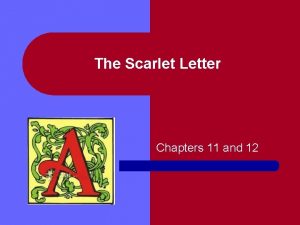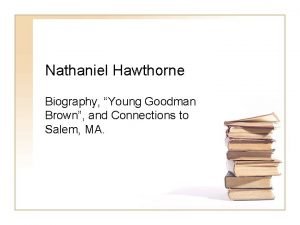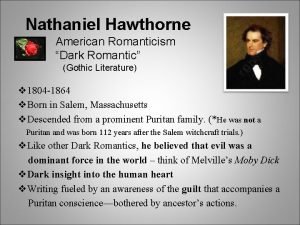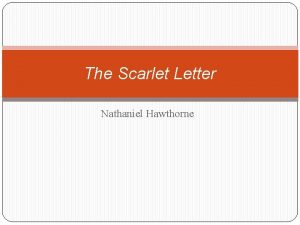Nathaniel Hawthorne and The Scarlet Letter Nathaniel Hawthorne






- Slides: 6

Nathaniel Hawthorne and The Scarlet Letter

Nathaniel Hawthorne – Considered a Romantic and a Transcendentalist – Born 1804, died 1864 – Related to John Hathorne, a judge during the Salem Witch Trials. – Embarrassed by his ancestors involvement in persecution and murder…he changed the spelling of his name. – While he worked as a customs official, he found documents which detailed the events which would become the story for The Scarlet Letter.

The Puritans – Believed in a more “pure” following of the Bible – Wanted the freedom to practice Christianity as they wanted and sailed for The New World in 1630, where they could be free from religious persecution. – The Scarlet Letter takes place 12 years after Puritan settlers arrived in the Massachusetts Bay Colony.

What do the Puritans believe? – The Scriptures provide step by step instructions for church conduct and organization, as well as for individual daily life. – Humans are put on Earth to honor God and follow the path God has laid out for them. – Human nature is evil and only God can save people from eternal damnation – The community has a responsibility t punish sinners harshly for the good of their souls.

Furthermore… – Music is forbidden! – Drama/plays are forbidden! – Poetry is forbidden! – Dancing is forbidden! – Swearing, idleness, and drunkenness is forbidden! – Excessive decoration/colored clothing

Lastly… – ONLY celebrated Christmas, May Day, Thanksgiving, Election day, and college commencement. – Limited democracy: only male church members could vote or serve in the government. – Church did not control government directly, but the church was the center of all life (literally). – The church was built in the center of town. – Believed in public humiliation and punishment (whipping, branding, etc. )











